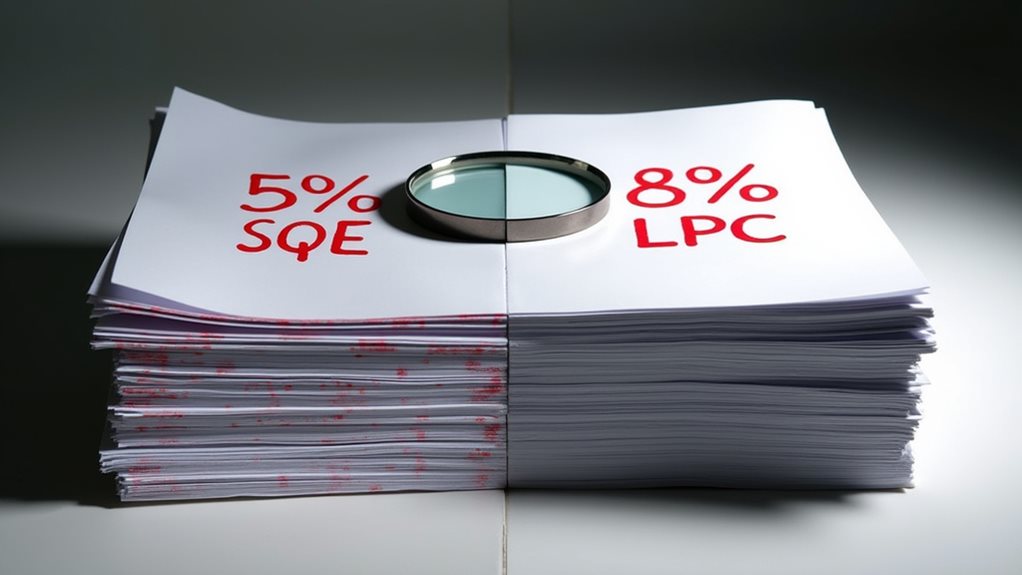You’ll find the SQE exam has distinct fail rates for its two components: SQE1 currently sees a 44% fail rate, while SQE2’s fail rate ranges from 19-26%. These numbers reflect the exam’s rigorous standards and challenging nature. Your success depends on factors like preparation quality, prior legal experience, and exam format familiarity. Understanding these statistics and their context can help you develop a more effective preparation strategy to boost your chances of passing.
Understanding SQE1 and SQE2 Pass Rates

Understanding the pass rates for SQE1 and SQE2 can feel challenging, especially when you’re preparing for these essential legal qualifying exams. Since these are relatively new assessments, you’ll want to focus on understanding the exam structure and how it impacts success rates.
SQE1 tests your functional legal knowledge through multiple-choice questions, while SQE2 evaluates practical legal skills through simulated scenarios.
To maximize your chances of success, you’ll need to leverage available preparation resources effectively. While official statistics aren’t yet extensive, you can improve your odds by familiarizing yourself with the assessment format and practicing under timed conditions.
Success in the SQE depends heavily on smart preparation, thorough understanding of exam formats, and regular practice under realistic conditions.
Remember that each component requires different preparation strategies, and success often depends on your ability to adapt your study approach to match the specific demands of both exams. Recent trends show that failure rates for SQE2 have varied between 19% to 26%, highlighting the importance of thorough preparation.
Historical Data and Performance Trends
Since the SQE exam’s introduction is relatively recent, broad historical data remains limited.
While you’ll find that pass rate trends are still emerging, early indicators suggest varying levels of success among different candidate groups. You’ll want to focus on thorough exam preparation, as initial data points to the importance of detailed study strategies.
Current observations show that each SQE sitting reveals patterns in candidate performance, though it’s too early to establish definitive long-term trends.
You’ll notice that success rates can fluctuate between examination periods, making it essential to maintain consistent preparation standards. The January 2024 SQE1 assessment highlighted a pass rate of 56%, which showcases exam difficulty’s impact on performance.
As more candidates complete both SQE1 and SQE2, you’ll gain better insights into which study approaches yield the best results, helping to inform your own exam preparation strategy.
Factors Affecting Success Rates
Several key factors heavily influence your likelihood of passing the SQE exam, ranging from preparation time to prior legal experience. Understanding the exam structure and focusing on thorough candidate preparation will greatly impact your success rate.
Here are the critical factors that affect your performance:
- Quality and duration of your study materials and resources
- Previous exposure to legal practice and practical experience
- Your familiarity with the specific exam format and question types
- Mental and physical well-being during preparation and exam day
- Access to mentorship and professional guidance throughout your journey
You’ll need to carefully manage these elements while developing a structured study plan. Additionally, implementing effective strategies such as mock exams under timed conditions can help solidify your understanding and boost confidence.
The interconnected nature of these factors means you can’t afford to neglect any single aspect if you’re aiming for ideal performance on the SQE.
Comparing SQE With Previous LPC Statistics

Making direct comparisons between SQE and LPC pass rates proves challenging due to the relatively recent introduction of the SQE system.
While you’ll find abundant SQE preparation resources emerging in the market, they differ markedly from traditional LPC study materials. The fundamental LPC curriculum differences make it difficult to draw meaningful statistical comparisons between the two qualification routes.
You’re fundamentally comparing two distinct assessment methods, each designed to test different aspects of legal knowledge and practical skills.
The SQE’s standardized format contrasts sharply with the LPC’s varied assessment approach across different providers.
When you’re evaluating success rates, it’s vital to take into account these structural differences rather than focusing solely on pass/fail percentages. Moreover, the SQE is designed to assess readiness to start as a solicitor immediately, which is a crucial distinction from the LPC’s focus on pre-qualifying preparation.
Until more SQE cohorts complete the assessment, you’ll need to be cautious about drawing definitive conclusions.
Regional and Demographic Pass Rate Analysis
Analyzing regional and demographic trends in SQE pass rates remains challenging due to limited available data.
You’ll find that current statistics don’t paint a complete picture of regional disparities and demographic influences across different areas and populations.
- Initial data suggests varying performance patterns between urban and rural candidates.
- Socioeconomic factors may impact candidate preparation and success rates.
- Access to study resources differs considerably by region.
- Language barriers could affect performance for non-native English speakers.
- Educational background variations show potential correlation with pass rates.
While you can’t draw definitive conclusions about regional performance patterns yet, it’s essential to monitor these trends as more data becomes available. Additionally, understanding the pass rates for SQE1 and SQE2 could provide insights into how different demographics fare in these assessments.
Understanding these demographic influences will help identify areas where additional support might be needed to guarantee equal opportunities for all candidates pursuing the SQE qualification.
Common Reasons for Candidate Failure
Understanding why candidates fail the SQE exam can help you avoid common pitfalls and better prepare for success. Your exam preparation strategy needs to be thorough and well-structured, as many candidates fall short due to insufficient depth of knowledge across key subject areas.
Success in the SQE exam requires understanding common failure points and developing a comprehensive strategy to master essential subject areas.
A negative candidate mindset often contributes to poor performance, with test anxiety and time management issues leading to rushed answers or incomplete responses. You’ll need to master both the technical content and psychological aspects of exam-taking.
Common mistakes include misreading questions, failing to provide adequate legal analysis, and not following specific answer formats required by examiners. Additionally, it’s important to be aware that failing the SQE three times can lead to significant financial and psychological impacts.
To maximize your chances of passing, you’ll want to focus on practice questions, mock exams, and developing strategies for managing stress during the actual test.
Strategies to Improve Success Probability

To boost your chances of passing the SQE exam, you’ll need to establish a rigorous practice routine that includes working through sample questions and timed mock tests.
You can identify your weak areas by analyzing your performance on practice exams and tracking the types of questions that consistently challenge you.
Once you’ve pinpointed these trouble spots, it’s essential to dedicate extra study time to strengthening your understanding of those specific topics through targeted review and additional practice exercises. Additionally, incorporating timed conditions during your mock exams can further enhance your readiness for the actual tests.
Practice Makes Perfect
Success on the SQE exam doesn’t happen by chance – it’s the result of consistent, focused preparation.
You’ll need to embrace effective exam preparation and study techniques to maximize your chances of passing. Regular practice sessions will help you build confidence and familiarity with the test format.
- Complete timed practice tests under exam conditions to build stamina
- Review past exam questions and analyze common patterns
- Create a study schedule that includes daily practice sessions
- Focus on weak areas by drilling specific question types
- Track your progress and adjust your study plan accordingly
- Incorporate spaced repetition into your study routine to enhance retention of material.
Focus on Weak Areas
When tackling the SQE exam, you’ll need to identify and methodically address your weak areas to boost your chances of success.
Begin with an honest weakness identification process by reviewing past practice tests and noting patterns in your incorrect answers. Track which topics consistently challenge you, and create a focused study plan that dedicates extra time to these subjects.
Don’t shy away from the areas where you struggle – instead, face them head-on. Use practice questions specifically targeting your weak spots, and seek additional resources or tutoring if needed.
Remember to periodically reassess your progress through mock exams, adjusting your study strategy as you improve. By confronting your challenging areas systematically, you’ll build confidence and develop a more thorough understanding of the exam material. The limited number of attempts allowed for the SQE further amplifies the pressure to succeed, highlighting the importance of targeted preparation.
Future Projections and Expected Changes
Looking ahead to future SQE exam pass rates, you’ll notice shifting trends as assessment criteria continue to evolve and adapt to industry demands.
You’ll need to stay informed about upcoming changes to testing methods, which may include new technology-based components and practical skills evaluations.
While historical data suggests fluctuating success rates, experts project more consistent outcomes as candidates and training programs better align with the exam’s developing standards. Recent data shows that the pass rate for first-time candidates has hovered around 60% pass rate, indicating a significant portion of candidates are effectively meeting the exam requirements.
Future Pass Rate Trends
Predicting future pass rates for the SQE exam remains challenging due to limited historical data and evolving assessment criteria.
As you prepare for future exam adaptations, it’s crucial to understand how candidate support initiatives might influence success rates in the coming years.
- Enhanced preparation resources and study materials may lead to gradual improvements in pass rates.
- Technology-driven assessment methods could impact how candidates perform on different sections.
- Refinements to exam structure based on early feedback might affect difficulty levels.
- Changes in legal education approaches could better align with exam requirements.
- Economic factors and market demands might influence the number of well-prepared candidates.
You’ll need to stay informed about these potential changes while maintaining flexibility in your study approach, as the exam’s evolution could greatly impact future success rates.
Evolving Assessment Criteria
The evolving assessment criteria for the SQE exam reflect ongoing adjustments to meet the changing demands of legal practice.
As assessment methods continue to develop, you’ll likely see modifications in how your legal knowledge and skills are evaluated. The evolving standards may incorporate new testing formats and technological advancements to better assess your practical abilities.
You’ll need to stay informed about these changes, as they’ll directly impact your preparation strategy.
Keep in mind that while core legal principles remain constant, the way they’re tested might shift. The SRA regularly reviews and updates their assessment approach to guarantee it remains relevant and effective.
You’d be wise to maintain flexibility in your study methods, adapting as new criteria emerge and focusing on developing well-rounded legal competencies.
Frequently Asked Questions
Can I Retake the SQE Exam if I Fail?
Yes, you can retake the SQE exam multiple times. Understanding retake policies is essential – there’s no limit on attempts, but you’ll want to refine your exam strategies before trying again to improve your chances.
How Much Does It Cost to Take the SQE Exam?
Like climbing Mount Everest, the SQE exam isn’t cheap. You’ll need to budget £3,980 for SQE1 exam registration and £2,820 for SQE2, totaling £6,800 for both assessments in your qualification journey.
Are There Any Age Restrictions for Taking the SQE?
There’s no upper age limit for taking the SQE exam. You’ll need to be at least 18 years old and meet the exam prerequisites, including having a degree or equivalent qualification before attempting it.
Can International Students Take the SQE Exam?
Yes, you can take the SQE exam as an international student. You’ll need to meet specific exam requirements, including having a degree or equivalent qualification, regardless of where you studied to establish international eligibility.
What Study Materials Are Officially Approved for SQE Preparation?
Purposefully prepare with SQE’s official study materials through Kaplan, their sole approved provider. You’ll access extensive resources including practice questions, mock exams, and online learning tools through their designated platform.
Final Thoughts
Like climbing Mount Everest, passing the SQE exam requires careful preparation and perseverance. You’ve learned that while pass rates hover around 50-60%, your success isn’t just a number – it’s about strategic preparation, understanding common pitfalls, and implementing proven study techniques. By staying informed about performance trends and adapting your approach accordingly, you’ll greatly boost your chances of joining those who’ve successfully conquered this legal qualification milestone.


